Faculty Distinctions: The World's a Laboratory
Recent faculty achievements include prestigious science grants, research in decolonial attitudes toward Russia, and much more
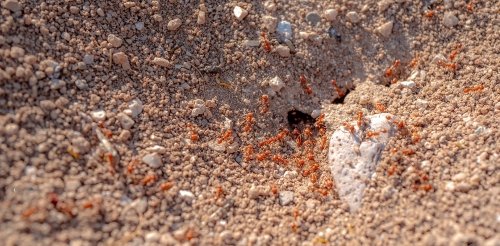
An unexpected source for medicinal cures? Ethan Van Arnam and his team are looking at the microbes carried by ants living in the American Southwest.
Seeking Cures in Unexpected Places
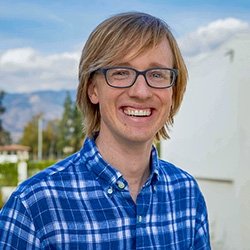
For his efforts in finding new antibiotics and other agents with medicinal potential, Ethan Van Arnam (pictured) and his lab have been awarded a three-year, $400,000-plus R15 grant from the National Institute of Health’s (NIH) Institute of General Medical Sciences.
“I’m excited about all of the new work we’ll be able to do as a result of the grant,” said Van Arnam, who is an associate professor of chemistry in the Department of Natural Sciences, “but I’m also proud of the substantial scientific foundation that students in my research group have built that made us competitive for this funding.”
Van Arnam serves as principal investigator for the three-year, NIH-funded project, “Leveraging symbiosis and desert biogeography for discovery of host-selected natural products,” which aims to find new medicinal molecules in the natural world. He said the goal of his lab’s research team will be to discover molecules “with medicinal potential” from a very unexpected source: the microbes that live on ants.
“We admit this is a very strange place to be searching, but microbes like bacteria and fungi have actually been a source for many transformative antibiotics, beginning with penicillin,” he said. “We know there are microbes out there in nature producing molecules with the potential to treat diseases.”
Connecting Hormones and the Brain
The National Science Foundation (NSF) awarded Assistant Professor of Neuroscience Tessa Solomon-Lane a $929,414 Faculty Early Career Development (CAREER) grant in 2024, which has funded a five-year research project, “Early-Life Social Environments Drive Behavioral and Neural Mechanisms of Development.” Through training young scientists, the project promotes scientific literacy and knowledge about behavioral neuroendocrinology (the study of how hormones and the brain interact).
Solomon-Lane also appeared in an article at The Transmitter, a neuroscience online publication highlighting scientists studying animals outside the traditional model standard. She discussed her research on the tiny cichlid fish.
Plant Life in a Changing Climate
Professor of Biology and Environmental Science Diane Thomson received a $345,000 Mid-Career Advancement grant from the NSF in 2024. Her project, “Evaluating Climate Drivers of Plant Demography,” studies how climate change affects plant populations. Her research informs conservation and ecological management efforts.
DNA by Another Name
The Research Corporation for Science Advancement recognized Chemistry Professor Aaron Leconte with a 2024 Cottrell Plus SEED Award for $60,000. Leconte is studying chemically modified forms of DNA, known as “XNA.” His project is exploring how to better synthesize XNAs, which can have biotechnological applications from medical diagnostics to therapeutics. For information on Leconte’s new book, see this issue's Community Bookshelf.
Studying Plant Genetics
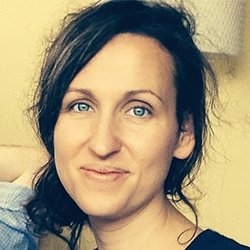
Associate Professor of Biology Findley Finseth (pictured) was selected for a $420,000 grant from the NSF in 2024. The grant funds her project, “Mechanisms and Consequences of Centromere Drive in Wildflowers,” for the next four years. Finseth’s research investigates the evolutionary drivers of biodiversity.
How Did Birds Start to Fly?
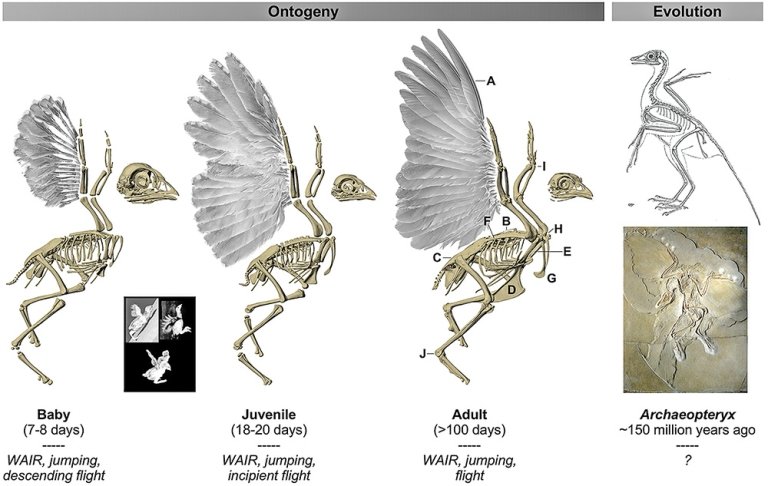
Assistant Professor of Biology Ashley Heers received a 2020 NSF CAREER grant of $577,300 for a five-year project about the evolution of flight in birds. If structures evolve slowly and in incremental stages, how do organisms acquire complex structures that seem useful only in full form? In other words, what is the advantage of half a wing? Heers studies rudimentary locomotor structures in immature birds with developing wings, adult birds with reduced wings, and extinct birds with incipient proto-wings. For more about Heers' work, read "Take Five," our profile of the five new STEM scholars who joined our faculty this year.
Department of Defense Research
Assistant Professor of Physics Sarah Marzen received a grant of more than $3 million from the Defense Advanced Research Projects Agency (DARPA), a research agency of the U.S. Department of Defense. Marzen is a co-lead investigator for the project, “Hyperspectral-Hyperdimensional Engines via Ultralow-Power Resonant In-Memory-Compute Systems and Tunable Phononic Combs,” which is funded through October 2027.
Seeking the Light
Assistant Professor of Chemistry Jia-Ahn Pan co-authored an article for Nanoscale Horizons. Upconverting nanoparticles (UCNPs) convert near-infrared light into visible light. Pan and his collaborators demonstrated that inorganic ligands could enhance UCNP emission and help integrate them into electrical devices. For more about Pan, see "Take Five."
Digital Economics
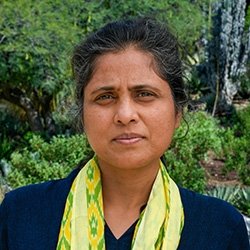
Assistant Professor of Economics Deepti Goel (pictured) co-authored an article in Review of Development Economics that revisits a digital tool’s effectiveness for a welfare program. Goel and co-authors re-examined evidence about whether the nationwide electronic fund management in the Indian employment guarantee scheme resulted in reduced expenditures. Contrary to the claim made in previously published work, they found no conclusive evidence that the digital reform led to savings to the national exchequer.
Poetry Through a Broken Lens
Professor of English and World Literature/Creative Writing Brent Armendinger published five poems in the fall 2024 issue of Broken Lens Journal, an acclaimed publication featuring poets and visual artists who are looking to stretch the limits of language and imagery.
Social Change in Education
Professor Emeritus of Sociology and Chicano/a-Latino/a Studies José Z. Calderón wrote a chapter about his scholar-activist experience in The Oxford Handbook of Sociology for Social Justice. In his chapter, “Participatory Research, Popular Education, and Action for Social Change,” Calderón discusses involving participants in research and action to create radical systemic change.
Contradictions in Ancient Architecture
John A. McCarthy Professor of Classics Michelle Berenfeld published the article “Elite Architecture and the Late Antique Ascetic Christian Communities of Cimitile and Sohag” in the Journal of the Society of Architectural Historians. Berenfeld studied the construction of lavish church complexes in communities that otherwise rejected the luxury of late Roman society.
What Do They Think of Russia?
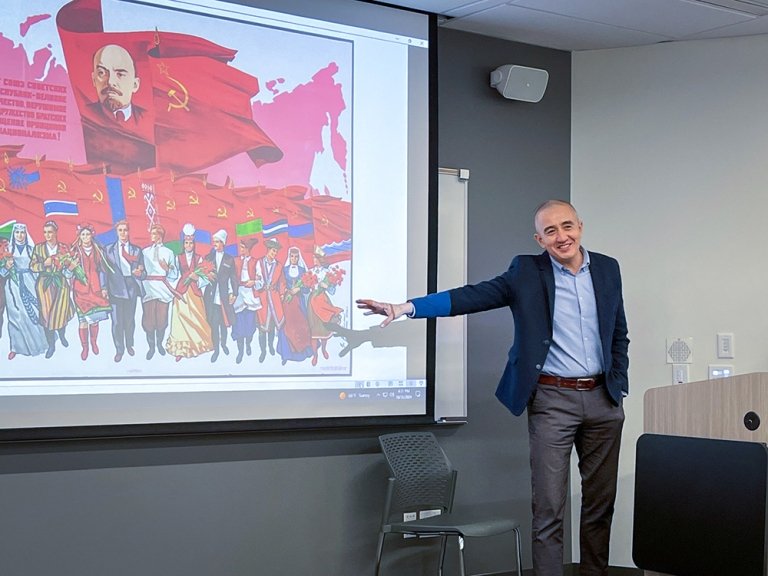
The U.S. Department of Defense awarded a $396,000 grant to Pitzer faculty to study how Russia's war against Ukraine has impacted public opinion in the Caucasus and Central Asia. The two-year project will survey public opinion in Georgia and Kazakhstan, which were once ruled by Moscow. Sociology Professor Azamat Junisbai (pictured) is the project’s co-lead investigator and is joined by Sociology Professor Erich Steinman.
Junisbai was born and raised in Kazakhstan. During a presentation to Pitzer faculty in the fall, he explained that for him the invasion “was a watershed moment that triggered a lot of soul-searching and reflection about the Soviet period, today’s Russia, the role of the Russian language, and many other things.”
The Joys of Jobs
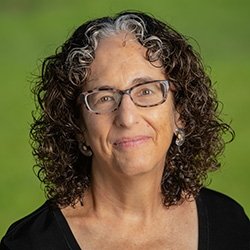
Jean M. Pitzer Professor of Anthropology Claudia Strauss (pictured) published the article “Small work pleasures and two types of well-being” in Economic Anthropology. Participants in Strauss’ study of U.S. job seekers described jobs they had held as “fun.” Strauss investigated how wage labor can contribute to well-being beyond an income.
Organizational Studies and Human Thriving
Organizational Studies Professor Barbara Junisbai is a 2024–25 Signature Course Fellow in the University of Notre Dame’s Institute for Ethics and the Common Good. Through the fellowship, she is designing a course to help students co-construct a local, community-centered, organizational learning praxis. For information on Junisbai’s new book, see this issue's Community Bookshelf.
Eco-Terror in Literature
English and World Literature Professor Amanda Lagji authored the chapter “Forms of Futurity: The Entangled Temporalities of Eco-Terror in the Niger Delta” in the book Temporalities in/of Crises in Anglophone Literatures. Lagji shows how Isidore Okpewho’s novel, Tides, “plots” environmental crises like the Niger Delta oil crisis as a turning point to stress urgency for action: Not just a form of slow violence, the environmental devastation should instead be understood as “slow terror.”
New Associate Dean Position
Associate Professor of Biology Sarah Gilman was appointed associate dean for academic and strategic planning effective January 2025. Gilman’s work focuses on accreditation and assessment, assisting with strategic initiatives, faculty support services, and using institutional and national data to support academic planning.
What Writing Means in a Pandemic
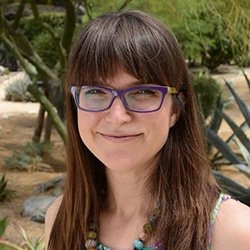
In a spring 2021 course, Professor of Academic Writing and Senior Director of College Writing Andrea Scott (pictured) guided students to do a research study about writing culture during and after the COVID-19 pandemic. Their work was recently published in the book The Post-Pandemic Writing Center: A WLN Digital Edited Collection. Scott co-authored the chapter with Dominique Biondi-Morra ’23, Jack Friedman ’23, Ryann Liljenstolpe ’24, Alexander Rodriguez ’24, and Gabriel Sherman ’23.
A Parting Glass With Nigel Boyle

A retirement reception on May 2 during Community Weekend was held for Professor of Political Studies Nigel Boyle (pictured). Boyle’s former students were invited to share what they have done with their Pitzer educations. That group included alumni from the Inside-Out Pathway-to-BA Program, which Boyle served as founding director of and considers his most important legacy at Pitzer.